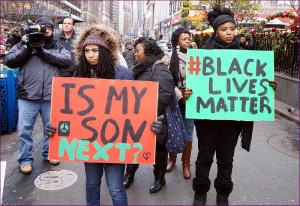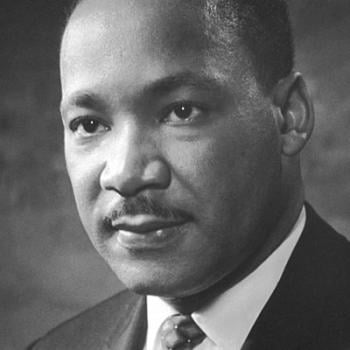
It seems to be remarkably hard for many white conservative Christians to affirm the slogan “black lives matter.” There are a bunch of possible reasons for this, of course. People who demur at the term sometimes point to the fact that the slogan is also the title of a (loose) organization, and that this organization has an official belief statement. Many conservative Christians, including many Catholics, will disagree with some things in that belief statement (primarily concerning queer and transgender issues). Hence, they may be reluctant to use a phrase that might imply that they support the “Black Lives Matter Global Network” without qualification.
The fear of shibboleths
A second objection, though, concerns the nature of slogans generally, specifically slogans used to establish group identity and draw lines between those who are “in” and those who are “out.” (These are often called “shibboleths” from an obscure story in Judges.) I’ve seen people complain in my FB feed that it’s perfectly possible to believe that black lives matter without using the phrase. Many conservatives seem to believe that if they use a slogan identified with progressive movements, they are submitting to some kind of Orwellian groupthink. The concern with possibly signing on to positions of which they do not approve connects to this second concern, of course. But the fear of slogans and “shibboleths” is a vaguer and more powerful one than any specific concerns about individual positions the BLM Network may endorse. It’s fundamentally about identity and group loyalty.
After all, it’s not as if white conservative Christians don’t have their own set of shibboleths. They don’t object, by and large, to using particular phrases as tests of loyalty and identity. But they fear that slogans identified with being “woke” come with “baggage” they don’t want.
I’m going to admit to having some sympathy with this general concern about the pressure to use particular progressive slogans. I prefer to use the language of orthodox Christianity and the natural law tradition. I have a visceral negative reaction to the jargon of contemporary “identity politics.” I dislike the polemical use of compounds with “phobic” in them because I think such terms typically lump together reasoned critiques with genuinely irrational bigotry, and dispense progressives from the hard work of showing why what they criticize is actually wrong. I don’t even like to use the word “feminist” about my own views on gender, although I pay careful attention to feminist perspectives and certainly affirm the equal dignity of women.
But I believe firmly that this particular progressive “shibboleth,” “Black Lives Matter,” is one that white Christians must use if we are to affirm the dignity of all human beings as our faith requires us to. Not to say, in the present moment, that “black lives matter,” is to fail to “stand in the gap” on behalf of our brothers and sisters of color. It is, at the very least, to compromise with racism and to abet its toxic power over our society.
The shibboleths of orthodoxy
The history of Christian doctrine provides us with examples showing why affirming particular phrases may at times be necessary, and why nuance can sometimes be an excuse for failing to say what needs to be said.
The classic example is the phrase “homoousios” used at the First Council of Nicea in 325, and enshrined today in the Nicene Creed that all Catholics repeat in Mass as our primary statement of faith. The phrase, affirming that the Son is “of one substance with the Father,” had a highly dubious history. The heretic Paul of Samosata was the best-known theologian to have previously used it. To many fourth-century Christians, it seemed to be saying that the divine Logos was part of some sort of divine “stuff”–a piece cut from the divine cloth, as it were–thus denying the real personhood of the Logos and the relationship of the Son to the Father. There were, in fact, much better reasons for objecting to “homoousios” than I’ve heard anyone give for objecting to “Black Lives Matter.”
Nonetheless, the Church concluded that this term was in fact necessary, and 1700 years later, here we are still saying it. Why? Because it affirmed, more effectively than any available alternative, the key point at issue: that the Son is, in fact, divine in the same way the Father is and not some sort of demigod. Lots of people proposed other alternatives that were more Biblical, more traditional, less controversial, and often perfectly fine in and of themselves. But these other alternatives did not draw the line that needed to be drawn. They allowed for too much equivocation on the point of central importance.
A similar example, for Catholics, is the phrase “transubstantiation.” True, this is a bit less definitive than “homoousios.” The Council of Trent says that the Church appropriately uses this term for the transformation of bread and wine into the Body and Blood of Christ, leaving open the possibility that we might find other language eventually. But nearly 500 years after Trent, we really haven’t. Modern suggestions such as “transsignification” and “transfinalization” turned out to be too vague and spiritualized, as were the various alternatives Protestants proposed in the sixteenth century.
Cardinal Gasparo Contarini, one of the 16th-century Catholic figures I most admire, caused a breakdown of negotiations for reunion at Regensburg in 1541 by insisting on the use of the phrase “transubstantiation.” Since Contarini was one of the most “ecumenical” Catholics of his time, and just had helped to preside over a remarkable (though short-lived) agreement on the key issue of justification, his intransigence on this issue has puzzled scholars, particularly Protestant scholars. It looks like a sudden reversion to unnecessary dogmatism. Many Protestants did have a strong belief in some form of Real Presence. Why was this particular phrase necessary? Why not instead look for common ground and see if both sides were saying the same thing in different language? Why not say the more innocuous “Real Presence” instead?
The problem was that, as with the Arian controversy, if you use the less controversial term you open up the possibility for all kinds of equivocation on the key point at issue. In Eucharistic theology, this is the claim that there is a real transformation of the bread and wine, a genuine eruption of the eschatological kingdom into the present world, something that cannot possibly be captured in purely “spiritual” language, noble though that language may be.
Language scarred by history
The dogmatism of the Catholic tradition derives from our commitment to the Incarnation. We believe that Truth has come into the world in personal, embodied form. The language we use to describe the infinite Mystery is marked, one might say scarred, by the particularities of history.
The language we use to express our commitment to social justice and human dignity must be equally specific, equally forceful, and, if necessary, equally controversial. We cannot be satisfied with vague, resounding generalities. Precisely because we believe that God has made of one blood all the peoples of the earth, we believe that Black Lives Matter. The specific, embodied history of this country is a history of injustice and degradation visited on black lives and black bodies, often by devout Christians (including Catholics) and using the language of Scripture and Christian tradition to justify the injustice. The phrase “black lives matter” recognizes this history and confronts it directly, as no more general language can possibly do.
Image: https://www.flickr.com/photos/otto-yamamoto/15305646874/, licensed under the Creative Commons Attribution-Share Alike 2.0 Generic license.












